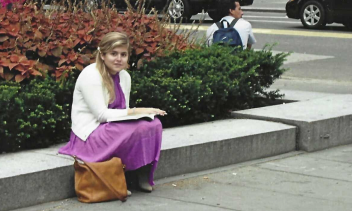He who binds to himself a joy, does the winged life destroy.
He who kisses each joy as it flies, lives in Eternity’s sunrise.
-William Blake
We often think of the day of Shabbos as a day outside of time. A taste of eternity, a smidgling of the timeless, a dance with the land of make believe, call it what you will, but there is one refrain that is fundamental to the countless lectures and lessons about Shabbos: Shabbos is a day beyond time. We say this for good reason and this temporal transcendence of this day is one of its most powerful qualities.
But like all beautiful ideas, it can be easy to get lost in the parable sometimes, for when we first read of God taking a rest in constructing the world, it seems clear that the seventh day, like the six days, are all part of one continuum of existence. “And on the seventh day, He rested and breathed.” Like the six days that precede it, a seventh day. I don’t say this because I feel the need to poke a hole in the transcendence of Shabbos—as I rush headfirst into Shabbos, I too occasionally taste the eternal, and aspire to taste it more—but because I wonder about what the urge to place Shabbos in the beyond-time says about all of us.
For one, this position says something about our relationship with the rest of our time. Do we see the entire construct of time as hopelessly implicated in mundanity, in our daily lives and the hustle-grind of our earthly existence? Do we place Shabbos outside of time because we need a refuge from the sands of time, from the transience that wears us down day after day? In more grounded terms, I wonder also if we could somehow find a way to place Shabbos within our week—within our construct of time—in a way that stretches our conception of what our time should be. By placing Shabbos outside of time, we are in a sense giving up on time, leaving time to this world, the world of taxes and tests. But I don’t want to give up on time so easily. Perhaps this is why I see Shabbos as specifically within time, a sense of the beyond from within the confines of our world, one that stretches our possibilities for what life can be. The seventh day, like the six preceding it, are all part of the unified construct of our time, a time that embraces and endures through good and bad, work and rest, the sacred and profane.
There’s another quality to this question, of Shabbos’s liminal position within and without time, and this has to do with how Shabbos has changed and developed throughout history. On the one hand, there is certainly an unchanging nature to the Shabbos that we practice, the rest in which we return to the origins of the world and God’s own rest. On the other hand, the way we celebrate eternity says something about the state of eternity in our world, which is to say: about the time we live in.
Shabbos is more than just a day without technology, and is equally about what we do as it is about what we don’t do.
The aesthetic of Shabbos, the tone and timbre and texture and all that, is all reflected by and expressed in the times that we live in. Put in less beer-soaked words, Shabbos in 2022 (or is it still 2021?) probably looks differently than it did in 1022 and in 0022 and in -022. Does the changing nature of the face of Shabbos also say something about how we celebrate the Shabbos? Perhaps. That brings us to our task here today: A Shabbos timeline! To honor and celebrate the changingly unchanging, or unchangingly changing, or … the history of our favorite day of the week, from Genesis until today. Here goes!
Biblical Shabbos
In the beginning was the word, and so many words at that. The beginning of the Torah is a storm of words and actions and creations, as the universe expanded and expanded until God stopped it all; “For on the seventh day He ceased from work and was refreshed.” There is something deeply radical to this line, a radicalism that lingers and echoes throughout time. God creating a universe, expanding, producing, and then stopping. How does one just stop? How did God do it? If I could just stop writing right now, stop typing, stop doing it all, would I? Do any of us dare stop with the same resolution that God has when pausing from the Work? Remember, the original word following “ceased” is vayinafash, which we translate here as “and was refreshed,” but the word also has textual association with the word nefesh, soul. Perhaps all we need to do is stop, stop thinking and trying and stressing so hard, and we too could become refreshed, resouled. Perhaps. Later on in the biblical era, we have the injunctions and commandments, as well as some striking formulations about what Shabbos can be for us. Check out Isaiah (58:13-14):
If you refrain from trampling the sabbath,
From pursuing your affairs on My holy day;
If you call the sabbath “delight,”
The LORD’s holy day “honored”;
And if you honor it and go not your ways
Nor look to your affairs, nor strike bargains— Then you can seek the favor of the LORD.
I will set you astride the heights of the earth,
And let you enjoy the heritage of your father Jacob—
For the mouth of the LORD has spoken.
What else can we add to words so powerful? That’s the biblical Shabbos.
Talmudic Shabbos
As it tends to go, the Talmudic sages figured out how to take a good thing and make it gooder—with rules! Enter the tractate of Shabbos, in which the sages embark on an arduous journey to understand and explicate what makes the day of rest what it is. In the ever-growing palace, or labyrinth, of laws that comprise the day of rest, the sages developed a way to universalize the Shabbos, replicating the construction of the world and the construction of the Mishkan to create a new sanctuary for the Jewish people. The sages also offered remarkably creative ways of seeing Shabbos in earlier times as well, such as imagining the Havdalah of Adam HaRishon, or when the very same Adam HaRishon taught the song of repentance to a broken Kayin, fresh from the sin that made him famous. It can be easy to feel critical about the legislationism of Shabbos during this era, but it’s important to remember that in every way that matters, the Talmudists were the architects of Shabbos, building the world of rest that we enter every weekend. So let’s raise a glass to the architects, who built our beloved Shabbos.
Medieval Shabbos
Let’s praise God for the medieval ages. Yes, we got the crusades then, and the inquisition, and all manner of Jew-killing all over, but we also were blessed with the great poets of Shabbos. Whether or not you sing the songs of Shabbos, some of the most powerful articulations of the rhythm of Shabbos were birthed in this era. Figures such as Judah ben Samuel of Regensburg (AKA Rav Yehuda HaChassid, as he is most affectionately known) and his contemporaries wrote elaborate zemirot, songs that bridge the literary and liturgical, building the perfect mood for singing songs with one’s family and friends. These songs have carried us through pogroms and pilgrimages, and we’ve sung them on empty stomachs and full.
Modern Shabbos
As the ghetto walls crumbled, Shabbos increasingly became a place of conflict, as the maskilim, who moved from the formal constructs of their families, challenged the structures of Shabbos, leading to wars over what Shabbos should look like. When persecutions rained down like water, Shabbos was far from easy to keep, but was a fundamental component to Jewish identity and ideas as Judaism left its cities and moved out into the world. Ignored and abused from within and without, Shabbos came into its own, in a way, as the Jewish people had the power of choice in choosing Shabbos for their own. We are still living in the echoes of this time.
Contemporary Shabbos
What does Shabbos mean in the contemporary era? In an age in which our attention is dominated by algorithms and social media, learning to detach ourselves and reinvest in a deeper way in our own lives is of increasing importance. But Shabbos is more than just a day without technology, and is equally about what we do as it is about what we don’t do. While on the one hand, fewer people than ever before keep Shabbos, on the universal scale, and that is a truth to be held, Shabbos also exists with a vibrancy that speaks to its power and potentiality. What will Shabbos mean in the world of today? Perhaps we will live the answer to this question, together.







